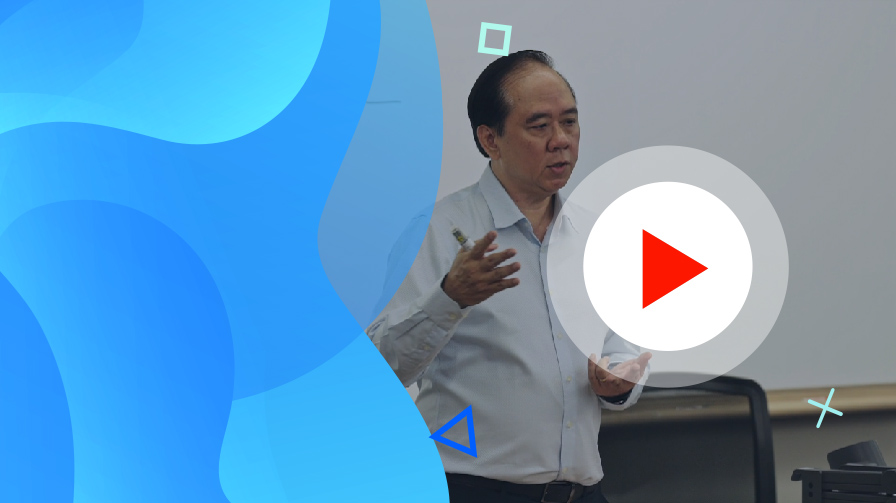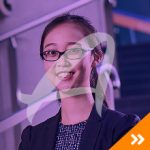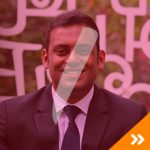

A seminar class by Associate Professor Simon Poh.


Moh Su Jin
Year 5 NUS Business Student, with specialisation in Finance and a double degree in Science with a major in Mathematics
Hi Su Jin! Why did you decide to pursue the double degree programme and also take on the University Scholars Programme (USP)?
I was one lost sheep when I had to decide on my university course! There were all sorts of choices, and I had no clue what I wanted to do. Looking for a broad-based, multidisciplinary programme and the possibility of customising my path in the future, I eventually chose to do the NUS Bachelor of Business Administration (BBA) with the USP. Being able to stay on campus in USP’s Cinnamon College was a great pull too!
Later, I also took on a self-initiated double degree, to pursue an interest in Math. This decision granted me the best of multiple worlds. I’ve also taken French modules grade-free and modules from the School of Computing
What has been your greatest take-away pursuing these programmes, personally and also for the future?
I believe my double degree programme and finance specialisation will place me in a good position to head in that direction when the time comes. It has also helped me develop varied skills and taught me time management, showing that it’s possible to meet multiple study and project deadlines, be an active member of a sports Co-Curricular Activity, and still find time for a life outside of academics.
How has the NUS Business School facilitated your pursuit of these academic interests?
By its nature, the NUS Business degree gives students time and flexibility to pursue other interests, academic or otherwise. With the new curriculum structure – fewer core modules and more specialisation choices – NUS Business School encourages you to either explore more widely across disciplines, or to go more deeply into one.
Do you have any advice for your juniors?
University offers far more options than we used to have. One of the best pieces of advice I received was a variation of a quote by Steve Jobs: “Of course it was impossible to connect the dots looking forward…but it was very, very clear looking backwards 10 years later.” So work hard, but also play hard. Don’t be afraid to forge your own unique path and trust that things will work out in the future.


Stephanie Lam
Recent NUS Accountancy Alumna, with specialisation in Marketing
Hi Stephanie! You were quite the global citizen during your time at NUS Business School! Where have you been and what were the opportunities about?
NUS Business School has given me so many overseas opportunities, I’ve been to eight countries with the School just in four years!
In my first year, I went for a summer exchange at Imperial College London, and lived on my own overseas for the very first time. It taught me a lot about independence and resilience. For my Year Two summer, I was lucky enough to secure an internship with Unilever in the Philippines, where I spent three months working on projects with people of different cultural backgrounds and values. It was a real eye-opener for me.
I then went on to take part in international case competitions across the globe, including in Hong Kong, New Zealand, Australia, the USA and Serbia. During these competitions, my team pitched business ideas and solutions to Multi-National Corporations and start-ups who sponsored the events.
There’s a lot to learn from visiting new places and talking to people who have lived different lives. The only way I could properly immerse myself in these cultures was to visit different countries extensively.
You were also heavily involved in case-consulting as one of your CCAs. How have such out-of-classroom opportunities sharpened what you learn during seminars?
My experience in the Case Consulting Group was amazing. It connected me with brilliant minds from universities all over the world. I’ve spent time at Copenhagen Business School, Queensland University of Technology, University of Southern California and a few more. I would say the three main takeaways that have helped me the most back in school are time management, analyzing unfamiliar business situations and working in a team with diverse skill sets.
Do you have any advice for your juniors?
Learn a lot! I think the best advice I’ve received is to just keep learning, wherever I go. There’s always something to learn from anyone and anywhere. Whenever I encounter something new, it reminds me of just how much more there is to learn. I feel that this has guided me well throughout university because when my focus is on learning, I take away so much more from every moment.


Abdul Rahman Khan
Recent NUS Business Alumnus, with specialisation in Finance and Management
Hi Abdul! You’ve pursued quite a few internships in a short span of 4 years. Tell us about them.
When I started at NUS Business School I quickly saw the importance of internships in confirming my interests in technology and consulting. The School’s strong reputation and the advice from its Career Services Office eventually helped me secure competitive internships at McKinsey & Company, MasterCard, Accenture and finally, Google. Each role required the ability to see opportunities in technology – problems I’d relish!
What important lessons did you take away pursuing these internships?
Prior to my internships, I had thought that hard skills like being able to use advanced tools in Excel were far more valuable than soft skills like problem-solving, critical thinking and communication. However, I’ve learnt that organisations tend to hire young people with the right soft skills such as critical thinking. So I’m really grateful that NUS Business School places a strong degree of emphasis on soft skill development from class participation to challenging projects that require one to adopt a problem-solving orientation.
What was the greatest challenge you encountered and how did you overcome it?
My internships in tech firms taught me the importance of being able to work in ambiguity – something which doesn’t come easily to most people. I found it really challenging when I first started out too. I was uncomfortable with the empowerment that comes with the ability to decide what I’d like to tackle each day. Thankfully, prior internships in management consulting equipped me with several tool-kits that helped me identify objectives, define problems and structure solutions. These thinking skills are extremely portable and very useful in business.
I am deeply grateful to NUS Business School for the one-on-one relationships I enjoyed with my career counselors and for the numerous industry exposure workshops, resume-vetting services and interview training sessions that truly gave me an edge when applying for highly competitive placements. The result is that I am able to project my strengths effectively and honestly, and carry myself professionally. Without the school’s support and resources, I don’t think I would have had the privilege and happy problem of deciding among multiple enticing job and internship offers!


Ganesh Muthupalani
Year 4 NUS Accountancy Student
Hi Ganesh! Share with us what made you take up the Bizad Leadership Development Programme (BLDP) and how has that been for you?
It was during one of our casual chats in my freshmen year that my senior recommended I join the BLDP, especially for its summer programme and the friendships he said he had forged with international students.
The summer programme was three weeks long, with one week each in NUS, Tsinghua University (China) and Indian School of Business (India) working with students on a product idea. I also gleaned knowledge about Entrepreneurship through interactions with startups, incubators and professors.
How has the School been instrumental in your personal development as a leader for the future?
Through the BLDP I also had the opportunity to interact with Frank Koo, Head of Asia Pacific at LinkedIn. One of the discussions we had was on career progression which he says should be seen as a jungle gym where one hops horizontally instead of always climbing a vertical ladder. After learning more about it, I’ve made a mental note to be more open-minded and courageous to swing horizontally and seize opportunities outside my field of work.
You’re also involved in many activities around the university! What are some of them and what motivated you to take them on?
During my time at NUS I’ve also been involved in the NUS Business Analytics Consulting Team (BACT) heading the Data Analytics team. I joined the club because “Data Analytics” was a buzzword but I knew little about.
I’m a huge Elon Musk fanboy. He often talks about the first principles way of thinking, in which decisions are made by starting with fundamentals that are commonly agreed to be true. Not all ideas that I proposed in NUS BACT were accepted wholeheartedly, and I learned it was crucial to put aside attachments to my own idea and think rationally. A collaborative effort allowed us to design and execute impactful initiatives.
Do you have any advice for your juniors?
My advice to my juniors would be not to pick something because the majority does it. Make your own decisions and you will have your own story to tell. Learn a new language, travel to places unheard of and break conventions!


Jolyn Moh
Recent NUS Business Alumna, with specialisation in Marketing
Hi Jolyn! You seem to be on quite an entrepreneurial streak! Please share with us what some of these experiences are.
My first “entrepreneurial” experience was when I was 7 years old, in primary one. I “rebranded” empty whiteboard markers as whiteboard erasers because the skinny marker tips help to erase marker ink by friction. This solves a pain for some students who have to erase the entire board because of a small mistake. I would trade empty whiteboard markers for full ones until my classmates realise what’s going on, haha.
Alright, jokes aside.
I’ve had an entrepreneurial streak in me since primary school, working on projects making, designing and selling my own products and even learning to negotiate with suppliers. Each experience taught me so much, and has led to my latest start-up, Keyframe, which helps individuals to cultivate meaningful relationships and utilize their digital time wisely.
What has been your greatest take-away thus far on this entrepreneurship journey and why?
Understanding how to deal and cope with ambiguity is by far my greatest take-away from this experience. It’s taught me to be patient when things do not go according to plan. My mentor has also been a great help, reminding me that just one person can accomplish one whole lot and I can be that one person. As Yoda would also say, “Do or do not. There is no try.”
How has the School been instrumental in fueling/developing this interest of yours?
NUS Business School is not just any other university. It is an ecosystem of opportunities ready for you to grab, be it going overseas to work with a bunch of like-minded peers on NUS Overseas Colleges, participating in competitions from the various faculties, or just trying out different interests.
Throughout my university years, I was involved in more than 10 Co-Curricular Activities across culture, clubs and sports that taught me how to work with people from various backgrounds. This helped me build a fierce work ethic and rigorous time management. There were hell weeks, but after them you learn that you’ve stretched yourself, you have a better sense of your identity and what you can do.
What is the best advice you’ve received?
One of the best bits of advice I’ve ever received is from my dad when I was 13: “不要觉得你自己很委屈。(很多人也有自己的烦恼。) ” It means you should open up your perspectives, don’t be held back by your own internal issues but be aware of the whole picture of everyone and everything around you.
For juniors entering university, I would encourage you all to envision how you guys want to graduate. by knowing how and what you are going to end the journey, then you will know what you want to do and when you want to do it. that being said, you will never have complete information to make a 100% soundproof decision, but you should not give up trying. just do the best you can for every situation and you’ll get somewhere, promise. 🙂

